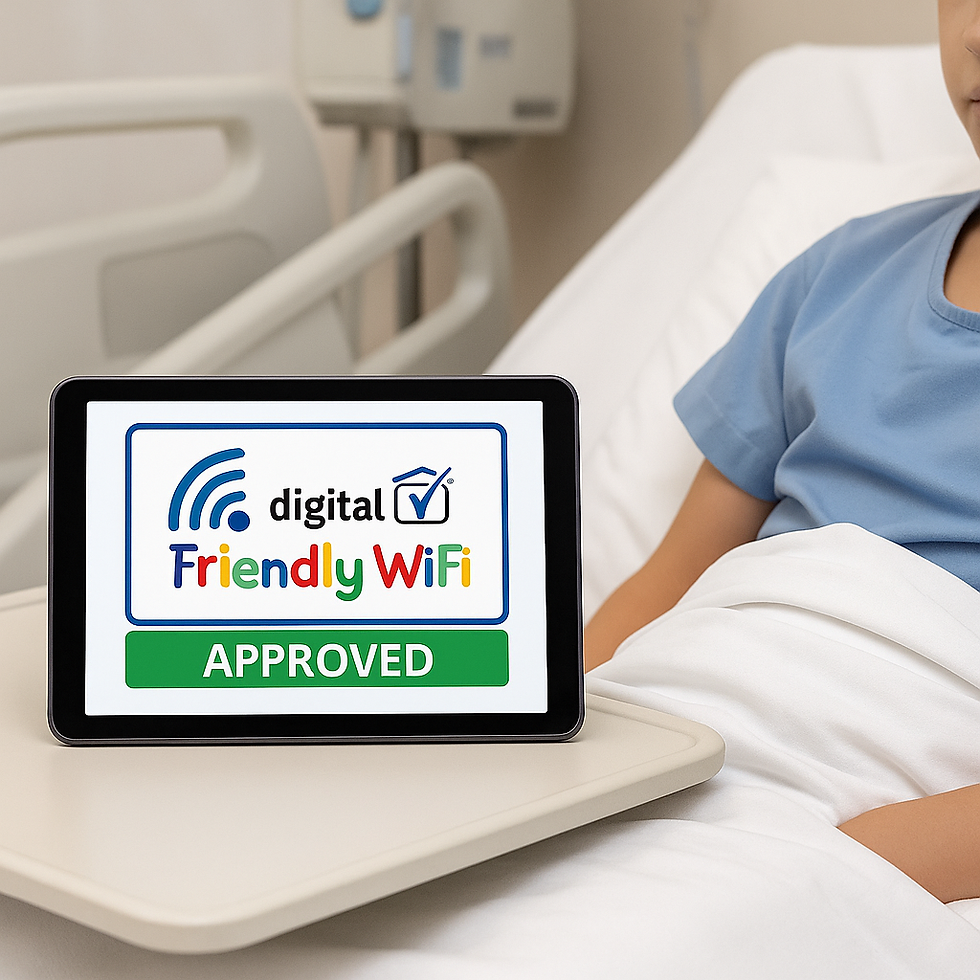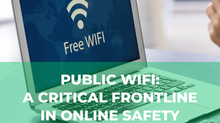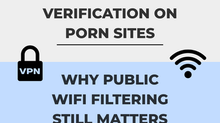Why NHS Hospitals Should Be Friendly WiFi Certified
- Friendly WiFi
- Jun 30, 2025
- 4 min read

NHS Hospitals are spaces of care, trust, and healing. As technology continues to play an ever-expanding role in our lives, even healthcare settings have embraced digital transformation. From digital patient records to online appointment systems and public WiFi access in waiting areas, the NHS is actively enhancing the patient experience through technology. But with that progress comes a critical responsibility: ensuring the online environment is safe for all users, especially children, young people, and vulnerable adults.
Public WiFi in NHS venues offers convenience, connection to loved ones, and vital access to health information. However, without proper safeguards, it can also expose users to harmful online content. This is why Friendly WiFi certification is more than just a badge — it’s a commitment to digital safety and safeguarding, aligning with the NHS's core values.
What Is Friendly WiFi?
Friendly WiFi is a government-initiated safety certification standard that ensures public WiFi services block access to pornography, child sexual abuse material (CSAM), and other harmful content. Launched in partnership with the UK Council for Internet Safety, the initiative verifies that certified WiFi networks meet recommended filtering standards.
The Friendly WiFi symbol clearly communicates to the public that the network they are using is filtered, safe, and aligned with online safeguarding expectations. It offers visible reassurance to parents, carers, and vulnerable users, promoting trust in the services and locations that display it.
Why NHS Hospitals Should Prioritise Certification
1. Protecting Vulnerable Populations
Hospitals cater to a wide demographic: children in paediatric wards, elderly patients, individuals with learning difficulties, mental health patients, and many others who are considered vulnerable. These groups are at higher risk of online harm. Providing a certified safe browsing environment is not only a legal consideration under safeguarding frameworks but also an ethical obligation.
2. Safeguarding Alignment with NHS Standards
NHS trusts already uphold strict safeguarding standards for patient care, including child protection, mental health risk assessments, and staff training. Adding Friendly WiFi to digital infrastructure aligns seamlessly with this safeguarding culture.
Displaying the Friendly WiFi symbol in hospital premises reinforces the NHS’s duty of care in the digital space and ensures consistency between physical and online safety.
3. Visibility and Public Reassurance
A hospital is a place where emotions often run high. For families, particularly those with young children, a safe and secure environment is crucial. Offering Friendly WiFi certification visibly demonstrates a commitment to their wellbeing. It shows that the hospital cares about all aspects of patient safety — including when they are online.
Friendly WiFi already certifies many NHS Trusts throughout the UK, including other healthcare venues.
4. Alignment with Government Online Safety Strategy
As the UK strengthens its stance on online safety through regulatory frameworks like the Online Safety Act, organisations in the public sector are expected to lead by example. NHS venues adopting Friendly WiFi certification supports national policy and signals a proactive approach to digital risk management.
5. A Simple Yet Impactful Step
Friendly WiFi certification does not require significant infrastructure overhaul. Many NHS networks already have filtering in place; certification provides validation and public accountability. The process is straightforward, and support is available throughout the application and implementation.
6. Enhancing the Reputation of NHS Trusts
In an era where public trust and transparency matter more than ever, Friendly WiFi provides NHS trusts with a chance to enhance their reputation as forward-thinking, safety-conscious institutions. For communications teams, it's an excellent story to share with local press, digital channels, and NHS stakeholders.
Real-World Examples and the Missed Opportunity
To date, NHS venues remain largely underrepresented among those who have gained Friendly WiFi certification, despite the alignment in values and benefits. Other public-facing sectors such as transport, libraries, and retail have already embraced the initiative, recognising the vital importance of safeguarding online spaces.
Imagine a child in an oncology ward using a hospital's WiFi to watch cartoons or play games. Without filtering, they could easily stumble upon inappropriate or harmful material. Certification eliminates this risk and prevents reputational and legal challenges for the Trust.
Steps to Certification
Assessment of Existing Infrastructure: Ensure current filtering meets Friendly WiFi standards.
Application and Verification: Complete the application process and submit evidence.
Approval and Use of the Symbol: Once approved, display the Friendly WiFi symbol throughout the premises and on digital channels.
Annual Review: Re-certification ensures standards are continually met and reassures the public that safety isn’t a one-time measure.
Conclusion: Time for Action
The NHS is one of the most trusted institutions in the UK. It leads the way in patient care, safeguarding, and social responsibility. Embracing Friendly WiFi certification is a natural next step in delivering holistic care that spans both the physical and digital realms.
By ensuring that patients, visitors, and staff can use hospital WiFi without fear of exposure to harmful content, the NHS can further protect the vulnerable and demonstrate leadership in digital safety. It's time for all NHS hospitals to make this small but powerful change — and proudly display the Friendly WiFi symbol as a mark of care, responsibility, and trust. Many NHS trusts and hospitals are already certified, setting the standard for safe connectivity.
The team at Friendly WiFi works in close collaboration with highly respected partners in the WiFi industry who are trusted by NHS Trusts to deliver secure, high-performance connectivity across healthcare environments. These partners play a vital role in ensuring safe and reliable access for patients, visitors, and staff — providing managed WiFi solutions that support clinical systems, public access, and digital healthcare initiatives.
Get certified today, or if you're reviewing your current setup or planning a network upgrade, get in touch and we’ll connect you with one of our trusted WiFi partners.












































Comments